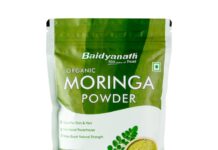Maggi has broken new ground by becoming the first major brand to use recyclable paper packaging to wrap individual bouillon cubes for its organic range in France. This is the latest result of an innovation drive to use more paper packaging for Nestlé products.
The new solution is a coated paper that is recyclable through the paper stream in France. Until now, the bouillon cubes have been wrapped in a multi-layer laminate that includes aluminum.
Agnes Lalanne, Global category lead for Cooking Aids at Nestlé, said, “We want to provide both healthy and more sustainable options. That’s why we’re happy to bring recyclable paper packaging to a favorite like these Maggi organic bouillon cubes.”
The paper used for the wrapper is from sustainable sources – pulp and paper mills certified by the Forest Stewardship Council (FSC) and The program for the Endorsement of Forest Certification – and its development marks another step in Nestlé’s commitment to making all its packaging recyclable or reusable by 2025, as the company works towards a waste-free future.
Torsten Pohl, head of Nestlé’s Product Technology Center for Food in Singen, Germany, said, “The main challenge our team faced was the creation of a foldable, sealable material that is robust enough to provide a sufficient barrier – to keep the product fresh and safe – whilst also being readily recyclable.”
Ahead of the launch, the team also worked on refurbishing and upgrading existing packaging machines to allow the new paper wrapping to run on them.
Maggi products – including bouillons, soups, seasonings, and sauces – are sold in over 90 countries. Nestlé selects local ingredients where possible to ensure that its bouillon cubes provide an authentic taste and texture, consistent with regional preferences and cooking styles. The cubes are fortified with vital micronutrients in some markets, such as iron deficiency.
IndiFoodBev — authentic, impactful and influential
An English-language food and beverage processing and packaging industry B2B platform in print and web, IndiFoodBev is in its third year of publication. It is said that the Indian food and beverage industries represent approximately US$ 900 billion in revenues which implies more than 20% of the country’s GDP. Eliminating the wastage on the farmside can help to deliver more protein to a higher number of the population apart from generating sizable exports. The savings in soil, seeds, water, fertilizer, energy and ultimately food and nutrition could be the most immense contribution that country is poised to make to the moderation of climate change.
To improve your marketing and grow sales to the food and beverage processing and packaging industry, talk to us. Our research and consulting company IppStar [www.ippstar.org] can assess your potential and addressable markets in light of the competition. We can discuss marketing, communication, and sales strategies for market entry and growth.
Suppliers and service providers with a strategy and budget for targeted marketing can discuss using our hybrid print, web, video, and social media channels to create brand recognition linked to market relevance. Our technical writers are ready to meet you and your customers for content.
The second largest producer of fruit and vegetables in the world is continuously expanding processing capacities and delivery systems with appropriate innovative technologies. We cover product and consumer trends, nutrition, processing, research, equipment and packaging from farm to thali. Get our 2025 media kit and recalibrate your role in this dynamic market. Enhance your visibility and relevance to existing markets and turn potential customers into conversations. Ask for a sample copy of our bi-monthly in print or our weekly IndiFoodBev eZine each Wednesday.
For editorial info@ippgroup.in — for advertisement ads1@ippgroup.in and for subscriptions subscription@ippgroup.in
Naresh Khanna – 10 February 2025
Subscribe Now











